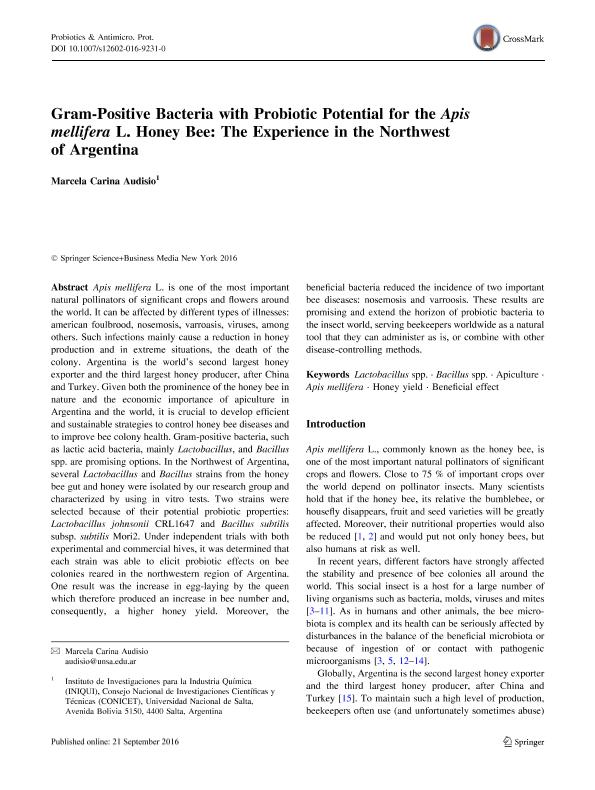Mostrar el registro sencillo del ítem
dc.contributor.author
Audisio, Marcela Carina

dc.date.available
2018-11-26T17:16:48Z
dc.date.issued
2017-03
dc.identifier.citation
Audisio, Marcela Carina; Gram-Positive Bacteria with Probiotic Potential for the Apis mellifera L. Honey Bee: The Experience in the Northwest of Argentina; Springer New York LLC; Probiotics and Antimicrobial Proteins; 9; 1; 3-2017; 22-31
dc.identifier.issn
1867-1306
dc.identifier.uri
http://hdl.handle.net/11336/65174
dc.description.abstract
Apis mellifera L. is one of the most important natural pollinators of significant crops and flowers around the world. It can be affected by different types of illnesses: american foulbrood, nosemosis, varroasis, viruses, among others. Such infections mainly cause a reduction in honey production and in extreme situations, the death of the colony. Argentina is the world’s second largest honey exporter and the third largest honey producer, after China and Turkey. Given both the prominence of the honey bee in nature and the economic importance of apiculture in Argentina and the world, it is crucial to develop efficient and sustainable strategies to control honey bee diseases and to improve bee colony health. Gram-positive bacteria, such as lactic acid bacteria, mainly Lactobacillus, and Bacillus spp. are promising options. In the Northwest of Argentina, several Lactobacillus and Bacillus strains from the honey bee gut and honey were isolated by our research group and characterized by using in vitro tests. Two strains were selected because of their potential probiotic properties: Lactobacillus johnsonii CRL1647 and Bacillus subtilis subsp. subtilis Mori2. Under independent trials with both experimental and commercial hives, it was determined that each strain was able to elicit probiotic effects on bee colonies reared in the northwestern region of Argentina. One result was the increase in egg-laying by the queen which therefore produced an increase in bee number and, consequently, a higher honey yield. Moreover, the beneficial bacteria reduced the incidence of two important bee diseases: nosemosis and varroosis. These results are promising and extend the horizon of probiotic bacteria to the insect world, serving beekeepers worldwide as a natural tool that they can administer as is, or combine with other disease-controlling methods.
dc.format
application/pdf
dc.language.iso
eng
dc.publisher
Springer New York LLC
dc.rights
info:eu-repo/semantics/openAccess
dc.rights.uri
https://creativecommons.org/licenses/by-nc-sa/2.5/ar/
dc.subject
Apiculture
dc.subject
Apis Mellifera
dc.subject
Bacillus Spp
dc.subject
Beneficial Effect
dc.subject
Honey Yield
dc.subject
Lactobacillus Spp
dc.subject.classification
Otras Ciencias Biológicas

dc.subject.classification
Ciencias Biológicas

dc.subject.classification
CIENCIAS NATURALES Y EXACTAS

dc.title
Gram-Positive Bacteria with Probiotic Potential for the Apis mellifera L. Honey Bee: The Experience in the Northwest of Argentina
dc.type
info:eu-repo/semantics/article
dc.type
info:ar-repo/semantics/artículo
dc.type
info:eu-repo/semantics/publishedVersion
dc.date.updated
2018-10-23T17:30:52Z
dc.identifier.eissn
1867-1314
dc.journal.volume
9
dc.journal.number
1
dc.journal.pagination
22-31
dc.journal.pais
Estados Unidos

dc.journal.ciudad
Nueva York
dc.description.fil
Fil: Audisio, Marcela Carina. Consejo Nacional de Investigaciones Científicas y Técnicas. Centro Científico Tecnológico Conicet - Salta. Instituto de Investigaciones para la Industria Química. Universidad Nacional de Salta. Facultad de Ingeniería. Instituto de Investigaciones para la Industria Química; Argentina
dc.journal.title
Probiotics and Antimicrobial Proteins
dc.relation.alternativeid
info:eu-repo/semantics/altIdentifier/doi/https://dx.doi.org/10.1007/s12602-016-9231-0
dc.relation.alternativeid
info:eu-repo/semantics/altIdentifier/url/https://link.springer.com/article/10.1007/s12602-016-9231-0
Archivos asociados
